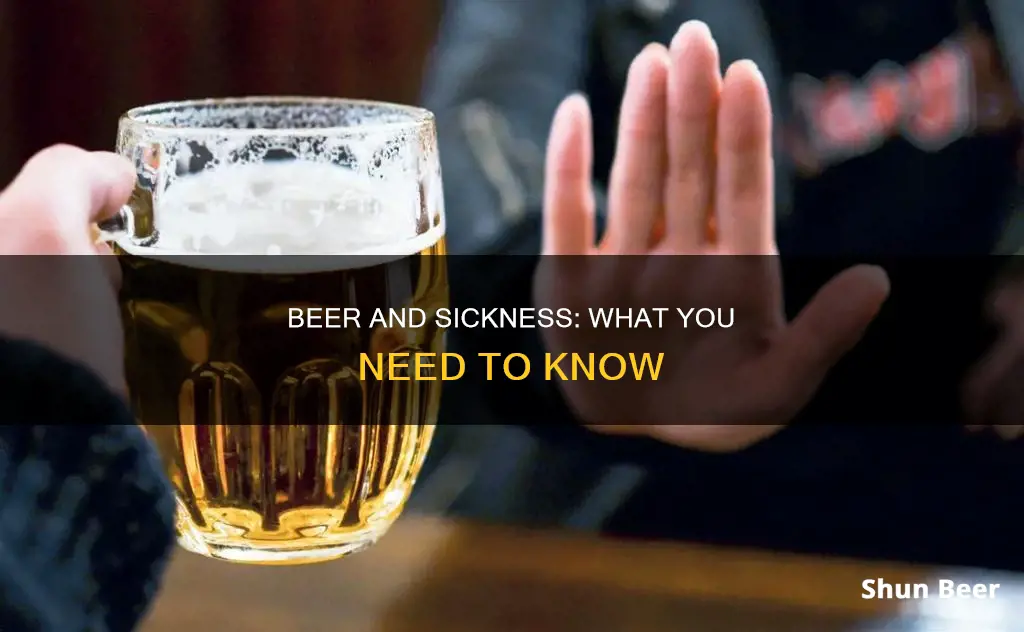
There are many misconceptions about drinking alcohol when you're sick. Some people believe that it can help to kill pathogens in your body and restore your health. However, this is not true. In fact, drinking alcohol when you're sick can have several negative effects on your body and may even prolong your illness. So, can you drink beer while sick? The short answer is no.
| Characteristics | Values |
|---|---|
| Effect on the immune system | Alcohol suppresses the immune system, making the body more susceptible to infections and slowing down recovery. |
| Effect on sleep | Alcohol can disrupt sleep, including REM sleep, which may worsen cold or flu symptoms and prolong recovery. |
| Interaction with medication | Alcohol can have harmful interactions with cold and flu medications, such as acetaminophen, chlorpheniramine maleate, pseudoephedrine, and phenylephrine. |
| Dehydration | Alcohol is a diuretic and can lead to dehydration, which can worsen congestion. |
| Exacerbation of symptoms | Alcohol can worsen symptoms such as headaches, body aches, nausea, vomiting, fatigue, and congestion. |
| Gut health | Alcohol can trigger inflammation in the gut, impairing the immune system's ability to fight off illness. |
What You'll Learn

Beer may not taste good when you're sick
Drinking beer while sick is generally not recommended. Alcohol can have a detrimental effect on the immune system, prolonging the recovery process and making you feel worse. However, some people believe that alcohol can help kill the pathogens that are making them sick, though this is not true in most cases.
One reason why you may not want to drink beer when you're sick is that it may not taste good. Colds and other illnesses can affect your sense of smell, which in turn impacts your sense of taste. This could leave you unable to enjoy the flavour of your beer.
In addition to tasting bad, drinking beer while sick can have other negative consequences. Alcohol is a diuretic, which means it will make you more dehydrated. This can lead to headaches, body aches, and fatigue, all of which will make you feel even worse when you're sick. Alcohol can also cause or worsen nausea, vomiting, and stomach pain.
Drinking alcohol while sick can also disrupt your sleep. While a glass of beer or wine might help you fall asleep, it will reduce the quality of your sleep by disrupting REM sleep and activating a sleep pattern called alpha activity, which prevents your body from getting the deep sleep it needs to recover.
Finally, drinking beer while sick can be dangerous due to potential interactions with medications. Many common cold and flu medications, such as acetaminophen, chlorpheniramine maleate, pseudoephedrine, and phenylephrine, can have negative interactions with alcohol. These interactions can lead to serious side effects, including liver damage, drowsiness, nausea, and difficulty sleeping.
Pizza Hut's Beer Delivery: How Does It Work?
You may want to see also

Alcohol can worsen symptoms
Drinking alcohol while sick is not recommended by health authorities. Alcohol is a toxin that can damage your immune cells and limit the function of your brain. It can also damage the small hairs in your lungs, impairing your breathing. Alcohol can trigger inflammation in your gut, making it harder for your immune system to fight off illness and leaving you vulnerable to further health complications.
When you are sick, your body works to fight off the illness. This means your immune system has to work harder to develop white blood cells to target the illness and remove it. Drinking alcohol prolongs this process, and you will likely be sick for longer. Alcohol is also a diuretic, which means it will dry out your body and worsen symptoms such as headaches and body aches. It can also cause nausea, vomiting, gastro pain, and fatigue.
Alcohol can also have harmful interactions with many cold and flu medications. For example, acetaminophen, a common pain reliever and fever reducer found in many over-the-counter cold and flu medications, should not be mixed with alcohol as it can cause liver damage. Chlorpheniramine maleate, an antihistamine that relieves symptoms like sneezing, runny nose, and itchy eyes, can cause worsened side effects such as drowsiness or nausea when mixed with alcohol. Pseudoephedrine and phenylephrine, common nasal decongestants, can also negatively interact with alcohol, causing difficulty sleeping and headaches.
In addition to worsening symptoms, alcohol can also prolong your recovery by interrupting your sleep. A glass of wine might help you fall asleep, but alcohol disrupts REM sleep, the most restorative type of sleep, leaving you feeling groggy in the morning. It also turns on a sleep pattern called alpha activity, which prevents your body from getting the deep sleep it needs to recover.
Anesthesia and Alcohol: Safe to Drink Beer Post-Procedure?
You may want to see also

Alcohol can cause dehydration
Drinking alcohol can cause dehydration, especially when consumed in large quantities. Alcohol is a diuretic, which means it causes your body to remove fluids more quickly than other liquids. This happens because alcohol suppresses the release of the antidiuretic hormone vasopressin, which controls how much water the kidneys reabsorb and retain. As a result, you lose vital fluids and electrolytes, and your body can become dehydrated.
The risk of dehydration is greater for older adults and people with chronic conditions. To counteract alcohol-induced dehydration, it is recommended to consume alcohol in moderation, drink slowly, and alternate alcoholic drinks with water or other hydrating beverages.
It is worth noting that some sources claim that alcohol does not cause dehydration, citing research that shows drinking alcohol does not lead to more urine output than drinking water. However, these sources also emphasize the importance of drinking water while consuming alcohol to support your organs, such as the liver and kidneys, which work overtime to process it.
Drinking Alcohol While Sick
It is generally advised to avoid drinking alcohol when you are sick. Alcohol can weaken your immune system, making your body more susceptible to illness and slowing down your recovery. Additionally, alcohol can interrupt your sleep, which is crucial for your body to recover from sickness. Alcohol can also worsen common cold and flu symptoms, such as headaches, body aches, nausea, and fatigue. Furthermore, drinking alcohol while taking certain cold or flu medications can be dangerous and lead to negative side effects.
Gluten-Free Beer: Enjoy Drinking Without Worry
You may want to see also

Alcohol negatively impacts the immune system
Drinking beer while sick is generally not recommended by health professionals. Alcohol negatively impacts the immune system in several ways, and its consumption can prolong recovery and worsen symptoms.
Firstly, alcohol weakens the body's ability to fight off infections. It suppresses the immune system, making individuals more susceptible to illnesses and slowing down the recovery process. This is because alcohol disrupts the gastrointestinal tract, which is crucial for maintaining a strong immune system. Alcohol can cause gut bacteria leakage, leading to inflammation and reducing the body's defences.
Secondly, alcohol interferes with sleep, which is essential for the body to recover from sickness. While a glass of wine might help you fall asleep, alcohol disrupts REM sleep, the most restorative type of sleep, leaving you feeling groggy and tired the next day. It also activates the sleep pattern called alpha activity, preventing the body from getting the deep sleep it needs.
Thirdly, alcohol consumption can lead to dehydration, which can worsen congestion and make symptoms more uncomfortable. In addition, alcohol interacts negatively with many common cold and flu medications. It can enhance their side effects, such as drowsiness and nausea, and increase the risk of dangerous driving.
Furthermore, alcohol can directly damage the immune system. It can alter gut flora, damage the intestinal lining, and impair the function of immune cells in the respiratory tract. These changes increase an individual's vulnerability to infections and diseases. Alcohol also affects the production and function of various hormones and enzymes in the body, which can have detrimental effects on overall health and well-being.
Lastly, excessive alcohol consumption is linked to an increased risk of developing specific diseases. For example, alcohol abuse is associated with a higher likelihood of pneumonia, hepatitis B and C, HIV, and other infections. It also increases the risk of cancer, liver damage, and other serious health complications.
Beer and Surgery: What's the Safe Wait Time?
You may want to see also

Alcohol can have harmful interactions with medication
Drinking alcohol while sick is generally not recommended by health authorities. Alcohol suppresses the immune system, disrupts sleep, and can worsen symptoms such as headaches, nausea, and fatigue. Additionally, it is important to consider the harmful interactions that can occur between alcohol and medication.
Alcohol can have dangerous interactions with certain medications, even when they are not taken at the same time. These interactions can lead to serious side effects and health complications. Some common medications that may interact with alcohol include:
- Acetaminophen, a pain reliever and fever reducer found in many cold and flu medications, can cause liver damage when combined with alcohol.
- Chlorpheniramine maleate, an antihistamine that relieves sneezing, runny nose, and itchy eyes, may have its side effects worsened by alcohol, including drowsiness or nausea.
- Pseudoephedrine and phenylephrine, nasal decongestants, can negatively interact with alcohol, leading to difficulty sleeping and headaches.
It is important to note that this list is not exhaustive, and other medications may also interact with alcohol. Always check with your pharmacist or healthcare provider to understand the potential risks associated with mixing alcohol and your specific medication.
Older adults are at a particularly high risk for harmful alcohol-medication interactions. Aging slows down the body's ability to break down alcohol, leading to prolonged presence in the system. Additionally, older individuals are more likely to be taking medications that interact with alcohol.
Even small amounts of alcohol can intensify medication side effects such as sleepiness, drowsiness, and lightheadedness. This can interfere with concentration, mechanical skills, and the ability to drive or operate machinery. The combination of alcohol and certain medications can also increase the risk of falls and serious injuries, especially in older individuals.
Alcohol can also make medications less effective or even useless, or it may cause the medication to become harmful or toxic to the body. Alcohol interacts with hundreds of commonly used prescription and over-the-counter medications, as well as herbal remedies. Therefore, it is crucial to observe warning labels, ask your doctor or pharmacist, and exercise caution when consuming alcohol while taking any medication.
Beer and Anxiety Medication: Safe Mix?
You may want to see also
Frequently asked questions
No, this is not true. Alcohol consumption can put your health at risk and leave you more susceptible to sickness and disease.
Alcohol negatively impacts your immune system and can prolong your illness. It can also worsen symptoms such as headaches, body aches, nausea, and fatigue. In addition, alcohol can have harmful interactions with certain medications.
Alcohol is a toxin that enters the bloodstream and limits the function of the brain and immune system. It damages immune cells, alters gut flora, and impairs the function of immune cells in the respiratory tract.
Yes, it is recommended to stick with just the medications you are taking and avoid alcohol until your symptoms improve. Getting plenty of rest, drinking fluids, and using saline spray or drops to help with congestion can also help with your recovery.







